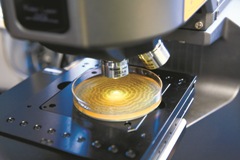Faculty of Science and Engineering
Physics

In the Department of Physics, students enjoy many aspects of physics that they were not familiar with in high school. We offer integrated educational programs to introduce a wide variety of physics. Lectures on main subjects (Classical Mechanics, Electromagnetism, Quantum Mechanics, Thermodynamics and Statistical Mechanics, and Physical Mathematics) include practical classes teaching useful mathematics to solve problems. In experimental courses students witness a superconductor levitated against gravity over magnets and quantum effects observed at low temperatures. Students are also able to improve their skills to use networks and computers in classes held at our IT Center.
Our twelve laboratories realize diversity of contemporary research in physics, covering the theory of elementary particles and black holes, superstring theory, astrophysics using space and ground-based observatories, laser spectroscopy, theoretical and experimental studies for solid state and soft condensed matters, quantum engineered systems, fractals and complex systems, and biophysics and bioinformatics. In the Department of Physics, we are confident that you will find your favorite field of study and complete your graduation research with great satisfaction. Studying in the Department of Physics gives you outstanding preparation for careers in the fields of sciences, industry, education, and business, or for continued academic research.
Fields of interest
- Field Theory and Relativity for Elementary Particles and Cosmology
- Astrophysics Using Space and Ground-Based Observatories
- Quantum Optics and Laser Spectroscopy for Ultracold Atoms
- Theory of Quantum Information and Simulation in Engineered Quantum Systems
- First-Principles Study of Electronic Structure and Properties
- Theory of Photoinduced Dynamics in Strongly Correlated Electron Systems
- Exotic Superconductivity and Quantum Critical Phenomena in Heavy Fermion Systems
- Solid State Physics for Novel Materials
- Statistical Physics and Mathematical Physics for Complex Systems
- Fractal Physics for Biological, Chemical, and Social Systems
- Nonlinear Physics and Bioinformatics
- Nonequilibrium Thermodynamics and Biophysics









